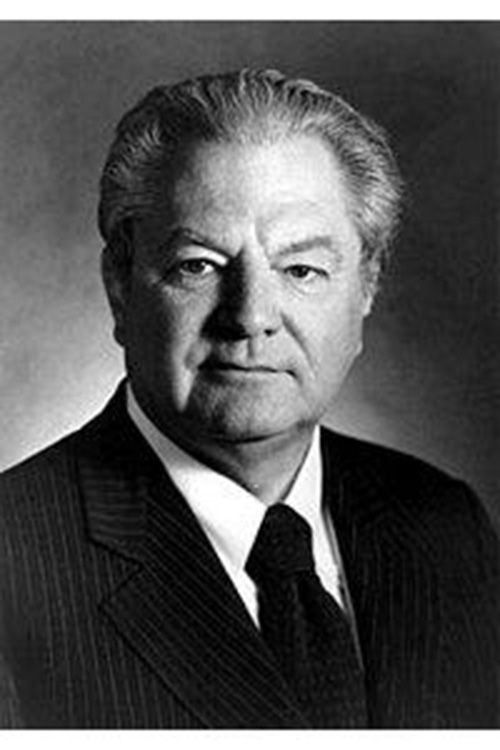Mr. and Mrs. Frank Craig Erwin, Jr., Endowed Presidential Scholarship
The Mr. and Mrs. Frank Craig Erwin, Jr., Endowed Presidential Scholarship was established by the Board of Regents of The University of Texas System on February 13, 1981, for the benefit of the Office of Student Financial Services. Gift funds were provided by Mrs. Ann L. Crain of Longview, Texas. The endowment honors Mr. Frank C. Erwin, Jr. of Austin, Texas, a 1948 graduate of The University of Texas at Austin School of Law and Mrs. June Carr Erwin of Austin, Texas.
Born in Waxahachie, Texas in 1920, Frank Craig Erwin enrolled at The University of Texas in 1937 and graduated with a law degree in 1948, after briefly leaving his studies in 1942 to serve in World War II with the Navy’s Pacific Theatre Operations.
As a student at Texas, Erwin showed early signs of his future activism and determination. He was a member of Phi Beta Kappa, Phi Eta Sigma, Phi Eta Alpha and Phi Delta Phi honors fraternities, as well as the Kappa Sigma social fraternity. In addition to his scholarly accomplishments, Erwin claimed that one of his proudest achievements was helping to organize a student rally which protested the dismissal of former UT president Homer Price Rainey.
His early taste of organized democracy left him hungry for more. In 1961, Erwin entered the political arena and aided former Secretary of the Navy John B. Connally in the run for Texas Governor, and Erwin’s ensuing political endeavors led him to a vast array of leadership opportunities.
Erwin served as the chairman of the resolutions committee at the state Democratic convention in 1962. He was then elected secretary and later chairman of the state Democratic Executive Committee. He also served as the Democratic national committeeman from Texas, vice chairman of the Texas delegation to the 1964 Democratic National Convention, and Texas delegate and spokesman at the 1968 Democratic National Convention.
During his time in politics, Erwin developed a close friendship with President Lyndon B. Johnson and orchestrated the construction and development of the Lyndon Baines Johnson Library and Museum located on northeast corner of the UT campus. Following the construction, Erwin was appointed to the board of the directors of the LBJ Family Foundation and later President and Director of the Rebekah Baines Johnson Foundation.
As founder and director of the Longhorn Club, president, and director of the Texas Longhorn Education Foundation and member of The Texas Exes Students Association, Erwin cared for the progression and growth of The University just as much as he cared for his beloved Texas Football team. His passion for The University of Texas is what would direct his career after politics.

Frank C. Erwin, Jr.
In 1963, he became a member of the University of Texas System Board of Regents, a position he held until 1975. Erwin served as chairman from 1966 to 1971, and those proved to be an impactful five years.
Thanks in large part to Erwin’s political allegiances, he increased the University of Texas Systems’ appropriations from $40.4 million to $349.7 million in a little more than a decade. He also increased the system’s available revenue by expanding the bonding capacity.
The financial gains allowed the University to work toward expansion, and building contracts issued by the regents during Erwin’s tenure amounted to more than $762 million. As square footage increased, so did the system’s enrollment—from 29,940 in 1963 to 77,437 in 1975.
By the time Erwin resigned, the University of Texas System, comprised of 12 component institutions, from universities to health institutions, had become one of the leading state-supported systems of higher education in the nation.
Erwin also helped change the Forty Acres in tremendous ways. Erwin helped create the Perry Castaneda Library, the College of Fine Arts and Performing Arts Center, Sid Richardson Hall, the Special Events Center and Bellmont Hall. He also worked to expand Memorial Stadium, Disch-Falk Field, the Texas Swimming Center, the Harry Ransom Center, the Education Building, the Grad School of Business Building, Jester Center, the Nursing Building, the Texas Union Renovation, the Welch Hall addition and the wall around the western and southern perimeter of campus.
In 1975, Erwin concluded his term with the board of regents, and returned to practicing law for the remainder of his life. He would receive countless awards honoring his work for The University of Texas and higher education in the state overall.
To those who knew him personally, Erwin was a trencherman, a classical music aficionado, and enjoyed nothing more than a good scotch. To those who knew him professionally, he was a politician, a gruff idealist, and a powerful activist for higher education.
He passed away on Oct. 1, 1980 after suffering a heart attack in Galveston, Texas. In a show of great respect, Erwin’s body laid in the Great Hall of the Lyndon Baines Johnson Library, an honor previously only given to President Johnson himself.
Erwin’s funeral was held in the University Special Events Center with more than 2,000 guests in attendance, including the Longhorn Band and the Longhorn Choir, which performed, “I Did It My Way” made famous by Frank Sinatra. The center itself would be renamed in his honor later that year.
Former Governor Connally delivered Erwin’s eulogy, and described his friend this way, “He had the courage of his convictions, he dared to do what was right, and he had the ability to pursue his goals and accept the consequences. He lived the life he wanted to live.”
How to Give
Learn more at giving.utexas.edu
Search Endowments
Look for inspiring stories
